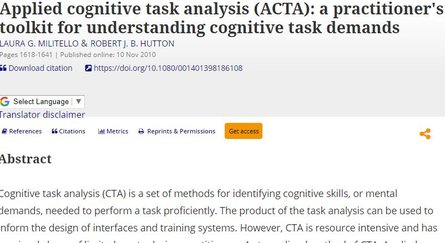
Cognitive task analysis (CTA) is a set of methods for identifying cognitive skills, or mental demands, needed to perform a task proficiently. The product of the task analysis can be used to inform the design of interfaces and training systems. However, CTA is resource intensive and has previously been of limited use to design practitioners. A streamlined method of CTA, Applied Cognitive Task Analysis (ACTA), is presented in this paper. ACTA consists of three interview methods that help the practitioner to extract information about the cognitive demands and skills required for a task. ACTA also allows the practitioner to represent this information in a format that will translate more directly into applied products, such as improved training scenarios or interface recommendations. This paper will describe the three methods, an evaluation study conducted to assess the usability and usefulness of the methods, and some directions for future research for making cognitive task analysis accessible to practitioners. ACTA techniques were found to be easy to use, flexible, and to provide clear output. The information and training materials developed based on ACTA interviews were found to be accurate and important for training purposes.